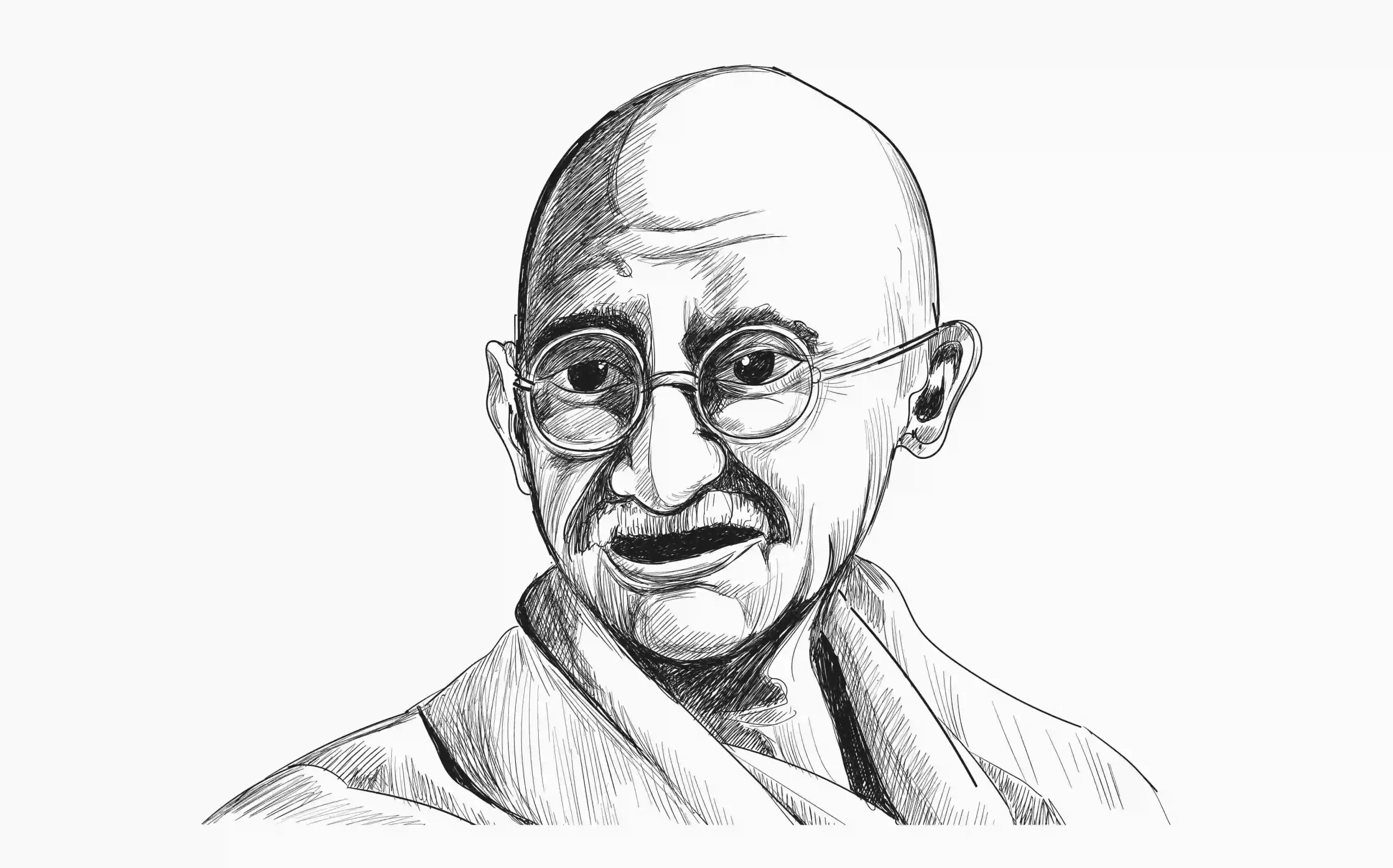1000-Word Essay on Mahatma Gandhi in English

Introduction
| Born | 2 October 1869 at Porbandar in Gujarat |
| Died | on 30 January 1948 |
| Parents | Karamchand Uttamchand Gandhi (Father); Putlibai (Mother) |
| Movement | Champaran Satyagraha Rowlatt Act Dandi March Gandhi Irwin PactQuit India Movement |
| Slogan | ‘Do or Die’ |
| Wife | Kasturba Gandhi |
| Political Guru of Mahatma Gandhi | Gopalkrishna Gokhale |
| Spiritual guru | Leon Tolstoy |
The life of Mahatma Gandhi is something that has to be learned and experienced because there is so much to know about this great personality and his life. The life of Mahatma Gandhi is a story full of inspiration and wisdom, which serves as an example to humanity. Mahatma Gandhi is an icon in world history and a great man who lived an incredible life. He was the father of India’s independence from the British Empire and a leader in civil rights.
His efforts to liberate his country from the British Empire and abolish the caste system led to India’s independence in 1947.
Mahatma Gandhi was one of the most outstanding political and spiritual leaders of the 20th century. He was a champion of nonviolence, and his moral and religious philosophy has had a profound impact on people worldwide.
Gandhi Ji was born on 2nd October 1869 in Porbandar, India, and died on January 30th, 1948.
This article is a brief overview of some of the major highlights in the life of Mahatma Gandhi and why we should remember him. From his birth to his death, his life story is worth knowing.
Who was Mahatma Gandhi?

Mahatma Gandhi was an Indian political leader who fought for India’s independence from British rule. After years of peaceful protests and civil disobedience, Gandhi helped lead India to freedom in 1947. He is also celebrated for his philosophy of nonviolent resistance.
Gandhi showed his courage by standing up to the British government when they prohibited Indians from wearing traditional clothing. How did he show that he respected the law of the land without compromising his own beliefs?
Mahatma Gandhi believed strongly in speaking about your feelings and showing them. He maintained that you should not just talk about something; you should take action on your feelings. Discuss this belief and its importance in today’s world. It is very important to speak out and tell others how you feel, but it is more important to act on those feelings by doing what you can do to help yourself or others to make a positive change.
What is the significance of his life?
Mahatma Gandhi is one of the most influential and important figures in history. His life and work have inspired millions of people around the world and continue to do so today. Gandhi’s achievements are many, but perhaps his most significant contribution was his role in leading India to independence from British rule. His philosophy of nonviolent resistance was instrumental in bringing about this meaningful change, and his legacy continues to shape the course of history.
Why is he called the Father of the Nation?

Mahatma Gandhi is often referred to as the “Father of the Nation” in India. This is because he played a leading role in the country’s struggle for independence from British rule. Gandhi was born in India in 1869, and he studied law in Britain. After returning to India, he began working as a lawyer. But he soon became involved in politics, and he started campaigning for Indian independence.
Gandhi was a skilled speaker and writer, and he used his talents to rally support for the independence movement. He also developed a system of nonviolent resistance, which he used to significant effect against the British. In 1947, India finally gained its independence, and Gandhi played a key role in this achievement. Many Indians revere him as a national hero, and his birthday (October 2nd) is now celebrated as a national holiday.
Hello, are you an artist or a creative person? Or do you want to learn new skills in creativity through a fascinating coloring book? If so, then you’ve come to the right place! We have launched a new coloring book that is available for sale on Amazon, Click the image and get your copy now and start coloring!
Strengths and weaknesses
Mahatma Gandhi is revered for his role in leading the country to independence and his philosophy of nonviolent resistance. However, some have criticized Gandhi Ji for his views on caste and women’s rights. Let’s take a closer look at the strengths and weaknesses of Gandhi’s ideas.
On the plus side, Gandhi was a masterful strategist who understood the power of public opinion. His civil disobedience campaigns helped to rally popular support for the independence movement. He also had a deep commitment to nonviolence, making him an inspirational leader.
On the downside, Gandhi’s focus on caste reform led him to alienate many low-caste Hindus. And his views on women’s rights were quite conservative by today’s standards. Nevertheless, Gandhi remains one of the most influential figures in Indian history.
His Political Involvement and Impact on India and the Western World
Mahatma Gandhi’s non-violent protests against British rule in India helped lead to the country’s independence, and his philosophy of nonviolent resistance has influenced political movements around the world. Here are some key facts about Gandhi’s political involvement and impact on India and the Western world.
Gandhi was born in 1869 in what is now Gujarat, India. He was educated in London and later practiced law in South Africa. While in South Africa, he became involved in the anti-apartheid movement.
In 1915, Gandhi returned to India and joined the Indian National Congress, committed to independence from British rule. He quickly rose to prominence due to his charisma and oratory skills.
Gandhi began leading mass protests against British rule in the 1920s. He advocated a form of nonviolent resistance that came to be known as satyagraha. This philosophy was based on the principle of ahimsa, or nonviolence.
Gandhi’s protest campaigns had a significant impact on Indian history. In 1930, he led a march to the sea to protest a tax on salt.
Mahatma Gandhi’s Political Movements
Mahatma Gandhi’s philosophy of nonviolent resistance inspired millions and helped to end British rule in India. This section will explore some of the political movements that Gandhi was involved in throughout his career.
– Satyagraha in South Africa (1906-07)
– Champaran Satyagraha (1917)
– Kheda Movement (1918)
– Khilafat Movement (1919)
– Non-Cooperation Movement (1920)
– Dandi March (1930)
– Quit India Movement (1942)
Gandhi Ji’s Involvement in India Pakistan partition
Gandhi Ji was entirely sympathetic to the Muslim demand for Pakistan and even prepared a part of his speech to support it. He wanted the Muslims to be a part of India’s leadership and wanted them to have an equal say in India’s decision-making process. Gandhi Ji worked hard to make sure that Hindus and Muslims could live together with mutual trust and respect. In fact, he had worked so hard over the years that he was widely considered the leader of all Indians, Hindu and Muslim alike.
Gandhiji wanted to see Nehru become the first Prime Minister of the country, but Jinnah was not ready for this, and he wanted to become the country’s prime minister. When the controversy escalated, it took the shape of a movement. Gradually, this matter was also settled between Hindus and Muslims, due to which Gandhiji approved the partition of the country.
Gandhi Ji’s Death
In the compound of Birla House (now known as Gandhi Smriti) in Central Delhi, Mahatma Gandhi was killed on January 30, 1948, at the age of 78. Nathuram Godse was the assassin who killed him.
In the grief of Gandhi’s death, we observe January 30 as Martyrs’ Day.
Conclusion
In conclusion, Mahatma Gandhi was an incredible leader who fought for the rights of his people. He was a man of peace who believed in nonviolent protests and civil disobedience. His legacy continues to inspire people worldwide to stand up for what they believe in and fight for justice.






